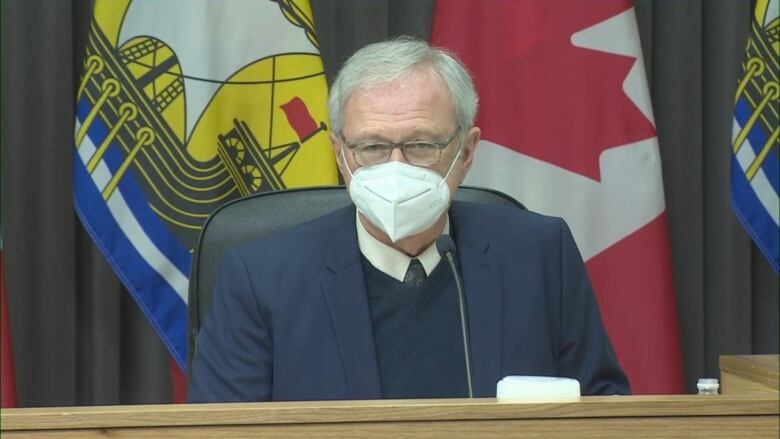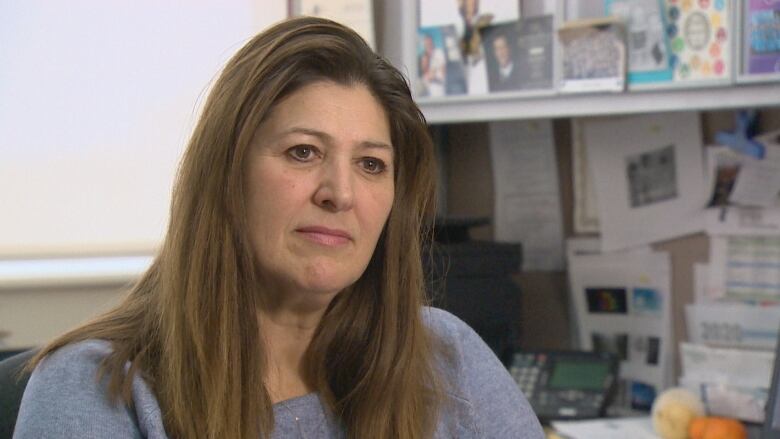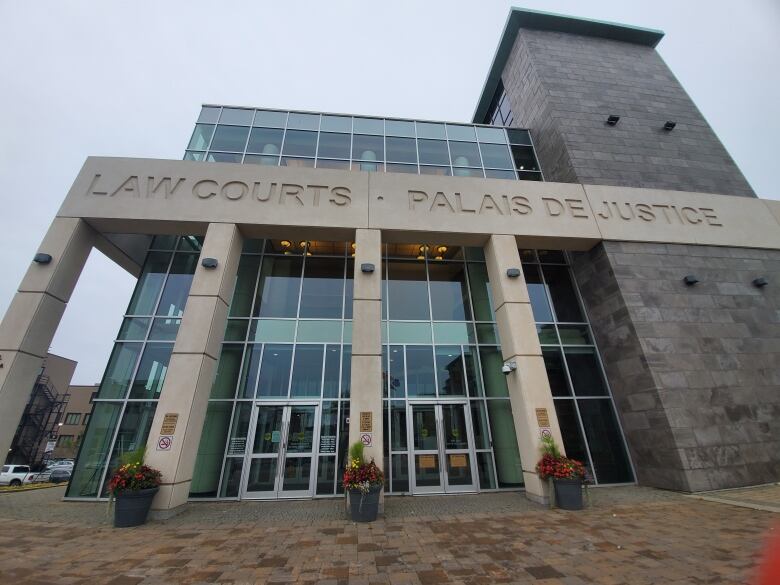N.B. COVID-19 roundup: 4 more deaths, 103 hospitalizations as province enters lockdown
Level 3 restrictions aim to avert life or death choices, says top doctor
Latest
- Breakdown of new cases
- Storm cancels some Moncton vaccination appointments
- Delta versus Omicron
- Horizon reminds patients most appointments postponed
- Trucker vaccine mandate could affect supply chain
- Omicron affects court hearings
- Q-Leaguedelays return to play
Public Health reported four more COVID-related deaths Friday and 103 COVIDhospitalizations, as New Brunswick prepares to enter a 16-day lockdown at midnight.
A person 70-79 in the Moncton region,Zone 1,a person 80-89 in the Saint John region, Zone 2, a person 70-79 in the Fredericton region,Zone 3,and a person 80-89 in the Edmundston region,Zone 4, have died as a result of COVID-19, raising the pandemic death toll to 182.
Of those in hospital, 11arein intensive care and three are on ventilators.
New Brunswick's chief medical officer of health says the province is moving to the strictest level of its COVID-19 winter plan so doctors aren't forced to make decisions about which patients live or die.
Dr. Jennifer Russell says New Brunswick's hospitals weren't "doing super" before the pandemic and have been under extra strain throughout.
But the fast-spreading Omicron variant has "really compromised our ability to continue to deliverreally quality acute services,"she toldCBC News Network on Friday, hours before the lockdown.
The biggest challenges, she said, are the increased number of hospitalizations for people with COVID-19and the number of health-care workers who have tested positive and are isolating 386, as of Thursday.
"So we're getting hit in two ways."
TheHorizon Health Network alone has already postponed more than 500 surgeries so far, Russell said.
Earlier this week, the province released COVID projections that showed hospitalizations would reach nearly 220by the end of the month, and new cases wouldpeak at 5,500 a day,if current trends held and no changes were made.
"As you get closer to that number, that means that we wouldn't be able to offer those critical care services, and having to make a decision for somebody who had COVID or non-COVID acute care needs, whether it's a car accident or heart attack, making choices around life or death for those individuals would be what it would come to," Russell said.
"And that's what we don't want to see happen."
- Social gatherings arelimited to single household bubbles.
- No public gatherings arepermitted.
- Restaurants are limited to drive-thru, takeout and deliveries only.
- Non-essential retail will remain at Level 2 restrictions, which include operating at50 per cent capacity and with physical distancing measures in place.
- Gyms, salons, spas and entertainment centres areclosed.
- Faith services areallowed only outdoors, virtually, or in-car.
- Organized team sports are prohibited from games, competition and practice with people outside of a household bubble.
In addition, public schools haveextended at-home learning for students until Jan. 31.
"I ask all New Brunswickers to do their part over the next two weeks, including booking their booster dose if it has been more than five months since their second dose especially if they are 50 or older, since only 53 per cent of people in this age group have gotten a booster dose and they are at a higher risk of hospitalization," Russell said in a statement late Friday afternoon.
She also noted children currently make up the largest segment of the unvaccinated and under-vaccinated population.
"If you have not already done so, please book an appointment to get your children vaccinated, especially those aged five to 11, before in-person learning resumes."

The province would not be movingto Level 3 if it could manage the hospital situation, said Premier Blaine Higgs.
"But we can't, and we've been told very clearly that we can't," he said on Information Morning Fredericton. "And the risk is that we wouldimpact people that had a critical need that was unrelated to COVID but wouldn't be able to get the services they needed.
"And we've heard doctors say they may have to make a decision on life or death because they just don't have the capabilities to manage it.We can't allow that to happen."
Russell said it's "critical" to get as many people vaccinated or boosted as possible over the next two weeks.
We have faith in the population. They are resilient. We are counting on them.- Jennifer Russell, chief medical officer of health
The province is in the process of increasingits capacity to administer about 90,000 doses a week, up from 40,000, she said, without elaborating.
On Thursday, Higgscalledon anyone "with experience giving vaccinations," retired nurses with critical care experience, medical professionals from other countries living in New Brunswick, andother groups to step up to volunteerservices.
Higgs also hintedmandatory vaccinations could be coming.
"We're going to do what is necessary to protect all of New Brunswickers and to compel people to get vaccinated," he said.
"Life will become increasingly uncomfortable and more difficult for those who are able to be vaccinated but choose not to be."
Russell said she could not comment on what any government policies might look like but did say the province is "definitely going to explore opportunities" to increase vaccination rates.

The province is also considering allowing health-care workers who have COVID-19 to return to work.
"These are not ideal situations or circumstances with respect to risk, but it's about balancing those risks, again, at this critical point in the pandemic and in the Omicron surge," she said.
The president of the New Brunswick Nurses Union is not in favour of putting COVID-positive nurses back to work.
Paula Doucet says it would be too stressful, physically and mentally.
"I don't think that's an ideal situation at all, simply because we don't know what the long-term effect of COVID may be. So if you're a health-care provider who's contracted COVID, you need that rest to recoup. You need that time away to potentially, you know, get yourself well."
Doucet said she understands that New Brunswickers need care and the system is strapped. But she doesn't think asking those who are COVID-positive to come back into the system is the answer.
"We need to look at other avenues and other health-care providers to help support nursing and frontline staff to provide the best care possible."
Russell said there are protocols regarding when COVID-positive workers would return to work, what protective gear they would wear, and how they would interact with patients and other staff. These would be "very strictly adhered to," she said.
"And again, it's out of necessity. We certainly don't want to put people at risk unnecessarily."
Asked whether a two-week lockdown will be enough to slow the spread of the virus and ease the strain on the health-care system, Russell replied:"Well, New Brunswickers have done this before. They know how to do it, and they know how to do it well.
"We have faith in the population. They are resilient. We are counting on them.
"The health-care system and the health-care workers and critical infrastructure folks, we are counting on thegood will of the population at this point in time, understanding that they're tired, understanding that they're frustrated, and this is, again, not an ideal situation, but out of necessity because of the serious nature of it, we have no choice."
Breakdown of cases
Fifty-two of the 103 people hospitalized with COVID were already admitted for other reasons when they tested positive, Public Health said. That's up from 47 Thursday.
It's unclear if or how many of them contracted the virus in hospital or were infected before they were admitted.
Of those in hospital,82 are over 60 and two are 19 or under.
Of the 11 people in intensive care, seven, or 64 per cent,are either unvaccinated, partially vaccinated, or it has been more than six months since their second dose.
There are426PCR(polymerase chain reaction) test-confirmed new cases of COVID-19, putting the active caseload at6,213, but that doesn't include the people testing positive on rapid tests.
An additional 756 people aged two to 49 with symptoms tested positive on rapid tests and registered their results online.
These numbers "are not intended to be taken as a true representation of the total number of cases in the province," Public Health has said.
The regional breakdown of the 426 new PCR-confirmed cases reported includes:
- Moncton region, Zone 1 145cases.
- Saint John region, Zone 297 cases.
- Fredericton region, Zone 3 50cases.
- Edmundston region Zone 4 23cases.
- Campbellton region, Zone 5 fivecases.
- Bathurst region, Zone 6 81cases.
- Miramichi region, Zone 7 25cases.
A total of 649,735PCR tests have been conducted to date, including 2,933 on Thursday, putting the positivity rate at 14.5 per cent.
As of Friday,29.8per cent ofeligible New Brunswickers havereceived a booster dose, up from 28.7 per cent, 83.3 per centhavereceived two doses, unchanged, and 91.1per cent have received one dose, up from91per cent.
New Brunswick has had21,979 PCR-confirmed cases of COVID-19 since the beginning of the pandemic, with15,582 recoveries so far.
Storm cancels some Moncton vaccination appointments
People who have COVID-19 vaccination appointments at the old Moncton High School on Saturday morning will need to reschedule, the Vitalit Health Network announced via a social mediapost late Thursday afternoon, citing the "impending weather."
Appointments scheduled between 9 a.m. and 11:20 a.m. will be cancelled, it said.
The clinic will operate between11:30 a.m. and 6 p.m., with extra appointments added between 4 p.m. and 6 p.m.,it said.
People can reschedule their appointment online.
Delta versus Omicron
A larger share of the COVID-19 cases in New Brunswick requiring hospitalization are non-Omicron than in the general population, figures provided by the Department of Health on Friday indicate.
"The screening undertaken on hospitalized patients, where possible, suggest 65 per cent were the Omicron variant," department spokesperson Bruce Macfarlanesaid in an email.
On Thursday, for example, only 21 of 37 hospital admissions who were screened positive for COVIDwere Omicron, he said.
By comparison,screeningof overallCOVID-positive cases suggests more than90 per cent of samples completed are the Omicron variant, Macfarlane said.

The Delta variant is more severe but not as transmissible as the now-dominant Omicron variant.
Delta patients tend to be sicker and need more specialized care, but vaccines protect better against the variant,Dr. John Tobin, the head of the family medicine department in the Edmundston region, Zone 4, for the Vitalit Health Network, has said.
With Omicron, vaccines don't protect as well against infection, but they do reduce the risk of hospitalization and death.
And Omicron symptoms tend to be less severe, not ending up in intensive careand not dying of COVID, Tobin said.
Although Omicron is less severe generally, officials anticipatethe sheer number of cases predicted overthe coming weeks will still put enormous strain on hospitals because some share of those cases will need hospital care.
Horizon reminds patients most appointments postponed
The Horizon Health Network is "strongly urging" patients not to attend their previously scheduled hospital appointments unless they're contacted directly by a hospital representative.
"Elective surgeries and non-urgent appointments for Horizon's ambulatory clinics, diagnostic imaging and laboratory services are being postponed as health care workers are being reassigned to areas where staffing support is most urgently needed," Horizon said in a statement Friday.
Oncology services are continuing.
Anyone who is uncertain about the status of their appointment should call ahead to the corresponding department, Horizon said.
"We fully appreciate the patience and understanding of the public while we work through these challenges."
Trucker vaccine mandate could affect supply chain
The head of the Atlantic Provinces Trucking Association expects new cross-border vaccine mandates will put added strain onsupply chains amid the latest COVID-19 surge and severe worker shortages.
Starting Saturday, all truck drivers entering the country must be fully vaccinated against COVID-19, regardless of whether they are Canadian citizens or foreign nationals,the federal government clarifiedThursday.
"Right now we can't afford to have any impact," said Jean-Marc Picard.
"Our driver shortage is real and if someone decides to change careers because of this, it's going to be impactful for some companies."
On Wednesday, agovernment spokesperson mistakenly said Canadian truckers would be exempt fromhaving to quarantine, even if they were unvaccinated or had received only one dose. On Thursday, federal officials corrected that information.
Picard hasestimated the industrycould lose between 10 and 20 per cent of drivers going cross-border.
He believes there will be consequences for the movement of commercial goods, such as groceries, includingempty store shelves and the cost of goodsgoing "through the roof."
Thevaccination rateamong truck drivers issimilar to that of the general population, according to Picardin the high 80 per cent range.
Omicron affects court hearings
All jury trials scheduled to take place in New Brunswick's Court of Queen's Bench between Jan. 4 and Feb.28 have been suspended,Chief Justice Tracey DeWare announced Thursday, citing the rapid spread of the Omicron variant throughout the province in recent days.
The trials will berescheduled "as soon as possible," she said in a statement.
"While jury trials have been successfully conducted in the province of New Brunswick since August of 2020, the recent surge of cases requires the court to take a prudent approach to ensure the health and safety of all court participants."
Anyone who received a summons to appear for jury selectionon Jan.15, 18or29need not attend.
All other Court of Queen's Bench trials and any other in-person matters already in progress when the Level 3 measurestakeeffect Friday at midnight will continue until they are concluded, according to new directives.
All scheduled criminal matters in which the accused is in custody, will proceed as scheduled, in-person, unless virtual or telephone appearances are available and approved by the presiding judge.

All scheduled in-person criminal matters in which the accused is not in custody, areadjourned until the Aprilmotions day, unless otherwise specified by the chief justice.
More details about changes to criminal and civil matters are available online.
In provincial court,anytrial, trial continuation, sentencing hearing or other hearing, preliminary inquiry, or decisionfor an accused or defendantnot in custody will be adjourned until Jan. 31 at 9:30 a.m. to set a new date,Chief Judge Marco Cloutierdirected.
He encouraged those affected to contact the court office before thento request a new date.
Any trial, decision or sentencing hearing, for an accused in custody will proceed as scheduled,in person.
Bail hearingswill be held by video conference.
More details are available online.
Q Leaguedelays return to play
The Quebec Major Junior Hockey Leaguehas delayed a return to play until Feb. 1, citing uncertainty of when COVID-19 restrictions will be eased.
The regular season was set to resume next week.
The league says it'sworking on rescheduling all postponed games, with aprimary objective of having all franchises play their full 68-game schedule.
With files from Shift and Jacques Poitras













_(720p).jpg)


 OFFICIAL HD MUSIC VIDEO.jpg)
.jpg)



























































































